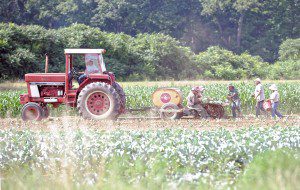WESTFIELD – Landmark immigration reform legislation passed by the Senate in April has given a glimmer of hope to 11 million people currently residing in the United States illegally that there may soon be a path to eventually become citizens of the USA.
According to an op-ed piece published in The Westfield News Thursday by Jon Niedzielski, Mass. State Executive Director for the USDA’s Farm Service Agency and a resident of Amherst, the Senate bill would reduce the national deficit by $850 billion over the next 20 years, and would add $300 billion to Social Security.
Niedzielski also went on to say that eliminating the non-citizen labor in the Commonwealth, which accounted for almost 20 percent of the farm workforce from 2007 to 2011, would cost the state anywhere from $40 to $70 million in the short term, a costly chunk of the $490 million that the Bay State’s nearly 7,700 farms bring in each year.
While the measure has yet to pass the House in Washington, in greater Westfield, farmers are weighing in on what immigration reform and legislation will mean to them and their livelihoods.
“We try to hire domestic help, but no one wants to work on a farm,” said Gene Kosinski, owner of Kosinski Farm in Westfield. “It’s very difficult to find workers.”
Kosinski’s farm participates in the H-2A program, a government program that helps farm owners cope with shortages of domestic workers by allowing entry of foreign nationals into the United States for seasonal work employment.
According to the Senate bill, a temporary work program would replace the H-2A visa eventually, putting in its place a three-year visa for year-round work in any agricultural job.
Kosinski says that his farm employs four to five employees including H-2A workers, and says that any workers his farm hires have to be properly documented and legally present in the United States.
When asked of whether he knew of any farms in the area that knowingly employed illegal immigrants, Kosinski gave a short and sweet reply.
“Not that I know of,” he said. “Farmers just can’t afford the risk. It is what it is, but we (Kosinski farms) work within the system.”
While Kosinski’s farm grows strictly vegetable crops, other area farmers are coping with this complex issue in other ways, including deciding to cash in their chips and leave the farm game entirely.
Joan Arnold, co-owner of Robert Arnold Farms, Inc., has all but stopped growing her company’s signature product, shade tobacco, due to what she believes are government restrictions designed to hurt farmers and other small businessmen.
“At this point, we’re nearing retirement age and transitioning mostly towards vegetables,” said Arnold. “The government is purposely trying to harass farmers and put them out.”
Arnold spoke of the glory days of tobacco production in Southwick, and of her own farm, what was once 40-acres of some of the most fertile tobacco-growing soil in the world, and how it has been driven to extinction by government regulation.
“It got to the point where it wasn’t worth it,” Arnold said of her company’s final years of mass production, when she was able to employ a large group of laborers from Jamaica to harvest the crops. “We loved having the Jamaicans here, they became like our family.”
Arnold would go on to say that employing seasonal Jamaican workers was vital to the production of tobacco.
“They could do the work that Americans just can’t do,” Arnold said, going into detail about the arduous process that goes into cultivating and subsequently drying out the big leafy plants.
“You’re lifting heavy weight all day, climbing 20 feet up in a barn to hang the leaves to dry,’ she said. “You need strong legs, arms. It’s not easy.”
“They are outdoors more than Americans, they have their own gardens, farms and animals. They aren’t lazy Americans,” said Arnold of the Jamaican laborers she would employ, typically around 40 to 48 during the growing season. “We have an unhealthy lifestyle compared to theirs. We’re behind computer screens and are inside all the time. Plus, because of a lack of work there, Jamaicans want to work, even seasonally, here… they would work incredible hours, but farming requires that.”
What was once a golden product for her farm, already reduced by pressure from health organizations, has been decimated almost entirely, save for a small parcel with which Arnold produces hybrid seeds which they sell to other farmers. She believes that the reform legislation would be nice, even if it is too late for her farm’s production.
“It needs to be done,” Arnold said.


